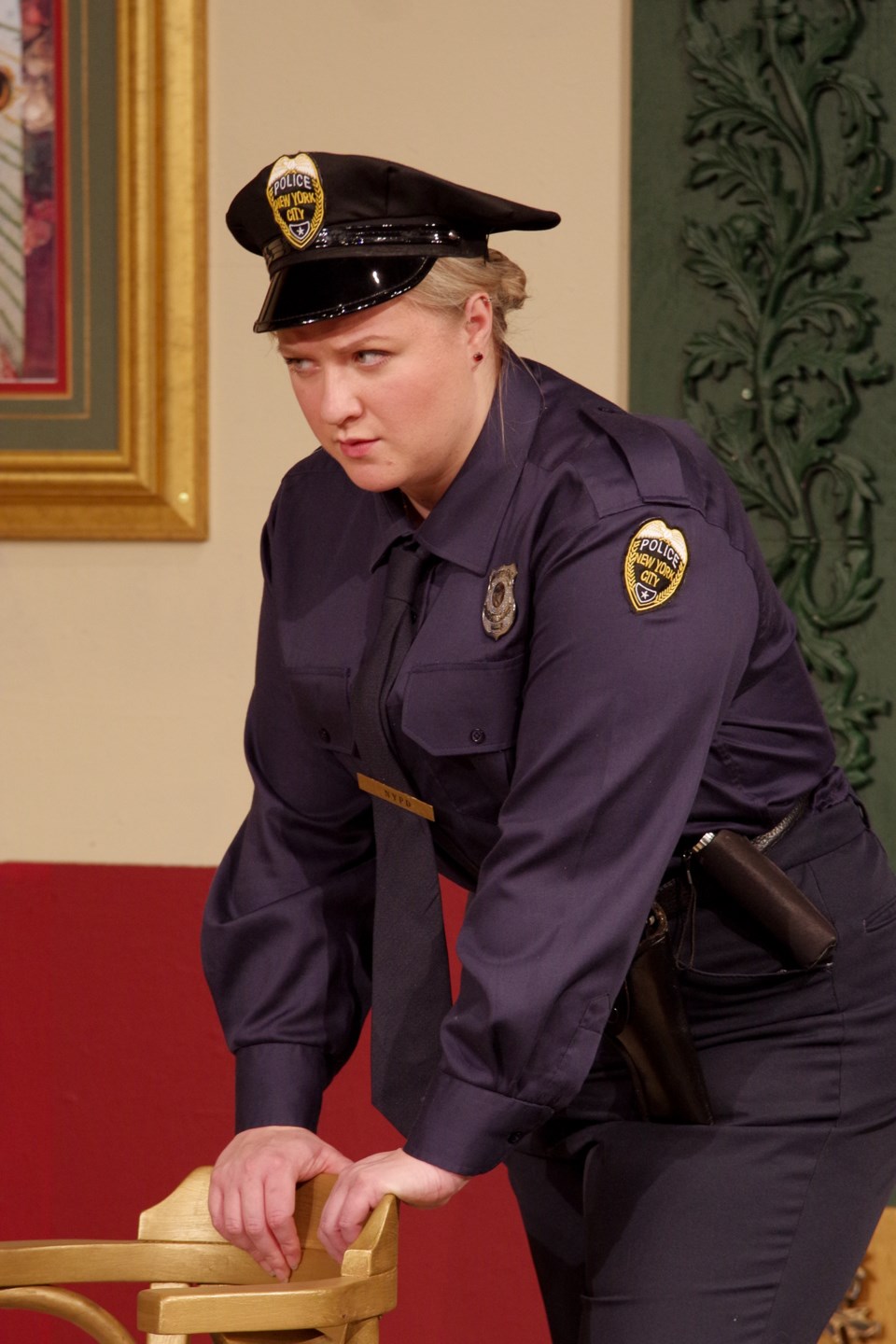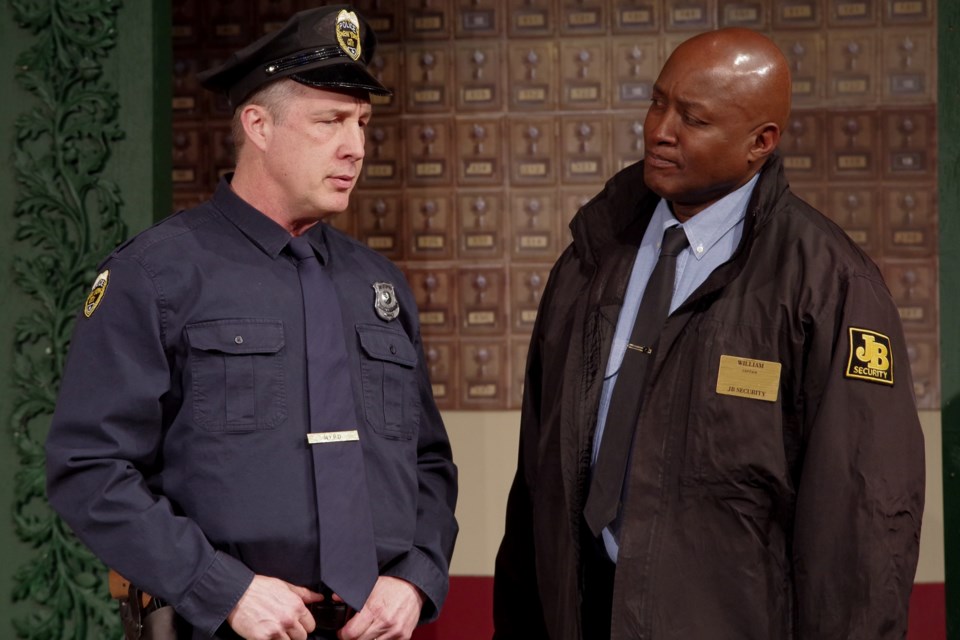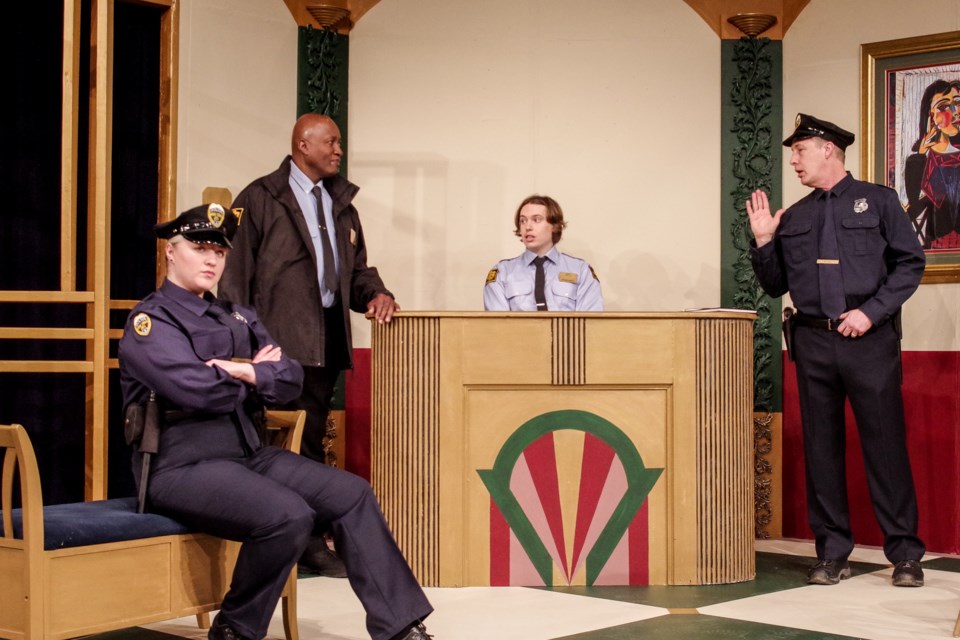It’s difficult to describe all that directing a play entails. At its simplest level, directing is about putting actors in places on a stage, and moving those actors around on the stage to most effectively reflect the dialogue.
But it is so much more than that: it’s about casting the show, putting a team in place, collaborating with a set designer, choosing music, approving the lighting and costumes, and much more.
Currently, I'm directing the Dundas Little Theatre production of Kenneth Lonergan's Lobby Hero. Here are a few things that have made this a unique experience.
First, my cast was small: three men and one woman. At rehearsals, four people from the team worked with the actors: me as director, stage manager Julie Donoahue, assistant stage manager Emma Ashurst and script assistant Mary Nolan.
While there were many others associated with the production – costumers, tech designers and assistants, our remarkable set designer Michelle Chin, a set construction team of eight others, and producers and publicists and box office people most of whom the director didn’t even need to see – it was a small core of eight people who worked closely three days a week.
Set design is key
Before I agreed to direct the show, I made sure set designer Michelle Chin, who has created numerous sets for Ancaster Theatre and Dundas Little Theatre, was available and willing to work with me. That’s how good she is, and that’s how much I respect her. Set design needs to be a perfect collaboration.
“I would love to design an art deco NY City apartment lobby,” she said. Great! What about a revolving door, I wondered. Michelle balked at the idea. She
had never built one, and wondered how difficult it would be. However, as a highly creative person, she took the challenge and her crew build me a revolving door.
More collaboration and discussion made us choose "Dora Maar," a painting by Picasso, as the art we would put on the wall. Michelle herself painted a reproduction, which symbolizes the mistress situation in the play and, with its double-face, it could also represent the hypocrisy of the situation.
Another great facet of the set work at Dundas is that they begin building the set as soon as the rehearsal process begins. The stage is transformed into a set at the same rate the actors are developing characters.
Similarly, our costumers, Elaine Sharp and Jane Snyder, made sure that their accurate costumes were ready to be donned by the actors as soon as possible so that they could feel the part.
An esprit de corps
But the most fulfilling part of the process of readying this play for production was that core group of four actors and four observers at each rehearsal. Doing a play is a unique experience in that the same group of individuals never work together again. What you have will be an extraordinary focus of work and talent which will all be over in 12 weeks, after which you put it to bed and hope the memory is a worthwhile one.
None of us had worked really closely with each other before, though Bernard Applewhaite played Tom Robinson and I played Atticus, seven years ago in To Kill a Mockingbird. Otherwise, all of us were strangers six months ago.
Everyone had a great attitude from Day One and looked upon the project in its most positive light. There were no egos to contend with (and believe me, I’ve seen them before – sometimes in myself), and there was an esprit de corps. We wanted to work hard at our own duties, and we worked to help each other as well. I suppose this attitude would be great to have in any workplace, come to think of it.
What made the co-operative attitude somewhat surprising is that every fictitious character in the play has “issues.” One is a selfish, self-centred misogynist, another a victim of that selfish one, a third is an immature jokester, and the last is a person with a dilemma which is forcing him to do something he never thought he would do.
Brad Forbes, who learned his lines faster than I’ve seen any actor do before, plays the smooth-talking but nasty cop Bill. And while he may be a smooth-talker, Brad is a gentle soul with nothing but good things to say about everyone who worked on the show and He listened well to direction.

Claire Shingleton-Smith plays Dawn, the rookie cop who is taken advantage of by the nasty veteran cop Bill. Claire had an exceptional audition, and we were
fortunate she accepted the role. Another actor had turned it down previously because of the psychological abuse the character must undergo. (Sometimes those onstage problems can get under the skin of good actors who take their roles seriously.)
Claire’s performances during the rehearsals were exceptional and she just kept getting better. The range of emotions she needs to go through onstage make the part very extremely challenging, but she’s handled it all with aplomb.
The play called for an Afro-American actor, and I was delighted to hear that Bernard was interested in acting on the Dundas stage. And the fact that we had played such an iconic duo before onstage made casting him a natural fit. He too has worked hard under direction to portray a character who is different from himself.
The first person I cast was Brian Gilmour, which is surprising because we had several capable young actors who auditioned for the part. His reading showed me, though, that he could exude the kind of goofy yet troubled nature that the character of Jeff required. That’s not to say Brian the actor is like that. Indeed, he is working toward earning his PhD in Philosophy. Like the other actors, he has worked hard and grown into the character to be someone completely unlike himself.
Opening night and beyond
The job of the director and that of the script assistant (Mary Nolan aka cookie baker extraordinaire) are over now that we are in production. The director’s job ends on opening night, and the maintenance of the play is in the sure hands of our stage manager Julie Donoahue, who has been the rock for our production, and also my extra set of eyes and ears. She saw and heard things I might have missed and gently made suggestions along the way.
Emma, the assistant stage manager cues the actors and inform the booth operators that everything backstage is ready to go as the play progresses.
I wish there were more I could convey about the wonder of the process. Perhaps watch Shakespeare in Love to get an idea. In it, one character wonders how it all comes together and another responds that it is a sort of magic. And it was magic!
Lobby Hero continues its run at Dundas Little Theatre this weekend (April 26-28) and next (May 3- 5). Tickets are available by calling 905-627-5266 or going online at
dundaslittletheatre.com.




